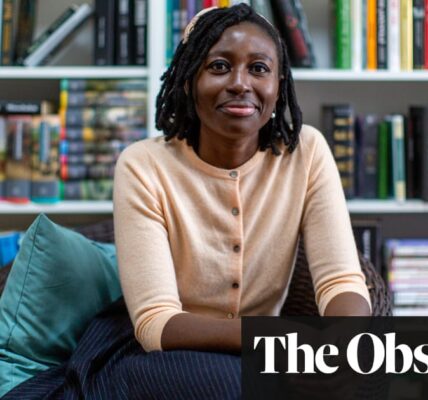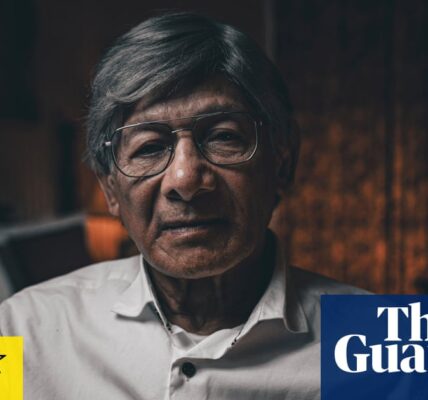The night before Naomi Klein won the inaugural Women’s prize for nonfiction, she discovered that someone had been going round London tearing down posters advertising her book. “And the weird thing is, I didn’t know what had angered them: vaccine disinformation, Zionism, or climate change and Fossil Free Books,” she told the assembled crowd.
Klein’s winning book, Doppelganger: A Trip Into the Mirror World, is an analysis of shadow identity that opens with a riff on the infuriating, longstanding confusion between the author and feminist turned conspiracy theorist Naomi Wolf. It ends with a deeply felt meditation on the mirroring of victim and persecutor evident in the current war in Gaza.
The book was published a month before the 7 October attacks on Israel by Hamas, but Klein, speaking to me in her publisher’s offices the morning after the ceremony, resists the suggestion that its publication was prescient. “We’re talking about an occupation that’s been going on since 1967 and a Nakba [the Palestinian word for catastrophe] that happened in 1948”. But she concedes that, “if you look back at the reviews, especially in the UK, there was a little bit of, ‘it started off well, but then what are we doing with all this settler colonialism and Israel thing’? I think some people felt it was a bit of bait and switch. But all doppelganger stories start out about the ‘other’ and end up being about something more uncomfortable.”

Klein, 54, is a professor at the University of British Columbia’s Centre for Climate Justice and a high-profile climate activist. Though all her work, beginning with her era defining debut No Logo in 1999, has shown that the personal is political, Doppelganger is her most personal book yet. Towards the end of the Covid pandemic, she was feeling as if she couldn’t write her usual “extremely directive, confident, this-is-what-we-need-to-do sort of book, but upgraded”, she says. Her husband, Avi Lewis, had recently lost a bid for election to the Canadian parliament. Right-wing populism was on the march around the world, fuelled by false news and conspiracy theories that had seduced even those who were once fellow travellers. “I was inspired by [the British-Jamaican sociologist] Stuart Hall, writing in the Thatcher years in ways that were very probing about left failures, and I think if we stay in the same ‘the revolution is around the corner’ mode, even when all evidence is pointing to the contrary, how credible can that left be?”
after newsletter promotion
This does not mean she no longer believes in direct action. In May, she signed a statement by the campaign group Fossil Free Books, calling for the investment management firm Baillie Gifford, which until recently sponsored a number of UK literary festivals, to cease its investments from companies linked to fossil fuels and Israel. The campaign has been viewed in some quarters as an own goal, resulting not in the firm’s divestment, but in its withdrawal from festival sponsorship. But Klein is unrepentant. “To me, the idea that all of the attention is on these activists and not on Baillie Gifford, which is a company that claims that it has supported the arts and has now stranded all of these festivals rather than face some accountability for themselves, is outrageous,” she says. “It’s like blaming a journalist for an investigation of a company if that company pulls its advertisements.”
“The whole message of Doppelganger is we are all enmeshed in these systems”, she adds. “Nobody’s pure, nobody is perfect. But that’s also not an excuse for doing nothing.”
Klein is not sure what her next book project will be – her life at the moment is all about teaching and activism, and she’s happy to say that her husband will be running for election again. The challenge remains to find a new rhetoric for newly challenging times. “If you think about my three biggest books – No Logo, or The Shock Doctrine, or This Changes Everything – they’re quite programmatic and rallying at the end,” she says. “While my intention is not to throw those books under the bus, I think that there are cyclical moments on the left, where we have to admit that we’re not where we want to be.
“If we are in a place where the right is rising and the left is losing, if we don’t have the ability to be self critical – if we continue to claim that everything we’ve always done is right – what hope do we have of changing and modifying and perhaps doing better in the future?”
Source: theguardian.com

